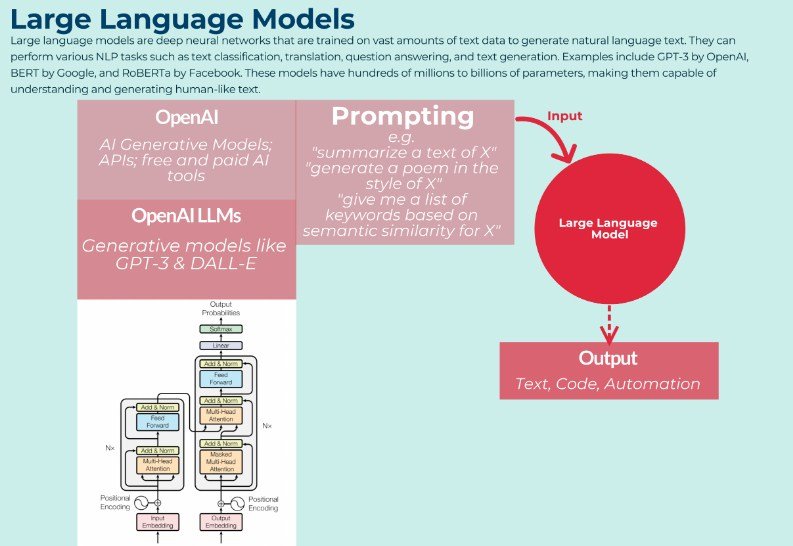Large language models (LLMs) are deep learning algorithms that can perform various natural language processing (NLP) tasks, such as understanding, translating, predicting, or generating text or other content. LLMs use massive datasets and transformer models to learn from text and produce outputs that can mimic human language. LLMs have been advancing rapidly in recent years, thanks to the availability of more data, computing power, and research. Some of the most popular LLMs include ChatGPT, BERT, and T5.
LLMs for Business Applications
LLMs have many potential applications for businesses across different domains and industries. For example, LLMs can be used to create chatbots, AI assistants, content generators, summarizers, translators, and more. LLMs can also be trained to perform specific tasks that are relevant to a particular business, such as analyzing customer feedback, generating product descriptions, writing marketing copy, or answering FAQs.
One of the main advantages of LLMs is that they can leverage the existing data that a business has to create customized and personalized solutions. For instance, a business can use its own customer data, product data, or domain knowledge to fine-tune an LLM and make it more suitable for its needs. This way, the LLM can better understand the context, intent, and preferences of the business and its customers.
Another benefit of LLMs is that they can reduce the cost and time required to develop and maintain NLP applications. Instead of building multiple models for different tasks or languages, a business can use a single LLM that can handle multiple tasks or languages with minimal modifications. Moreover, LLMs can be updated and improved continuously with new data and feedback, making them more adaptable and scalable.
Challenges and Opportunities of LLMs
Despite their impressive capabilities, LLMs also pose some challenges and risks for businesses. One of the main challenges is the ethical and social implications of using LLMs. For example, LLMs can generate content that is inaccurate, misleading, biased, or harmful to some groups or individuals. Therefore, businesses need to ensure that they use LLMs responsibly and transparently, and that they monitor and evaluate their outputs for quality and reliability.
Another challenge is the technical and operational complexity of using LLMs. For example, LLMs require a lot of data, computing power, and expertise to train and deploy. Therefore, businesses need to invest in the necessary infrastructure, tools, and skills to use LLMs effectively and efficiently. Additionally, businesses need to consider the security and privacy issues of using LLMs, especially when dealing with sensitive or personal data.
Despite these challenges, LLMs also offer many opportunities for businesses to innovate and differentiate themselves in the market. For example, LLMs can enable businesses to create new products or services that leverage natural language as a key feature or value proposition. Alternatively, LLMs can enhance existing products or services by adding natural language capabilities that improve the user experience or customer satisfaction. Furthermore, LLMs can help businesses gain insights and intelligence from their data by using natural language as a medium or interface.
The Future of LLMs
LLMs are expected to continue evolving and improving in the future, as more research and development are conducted in this field. Some of the possible directions for future LLMs include:
- Multimodal LLMs: These are LLMs that can process and generate not only text but also other types of data or content such as images, audio, video, or graphs.
- Interactive LLMs: These are LLMs that can engage in natural and dynamic conversations with humans or other agents.
- Explainable LLMs: These are LLMs that can provide explanations or justifications for their outputs or decisions.
- Creative LLMs: These are LLMs that can produce original and novel content or solutions that go beyond existing data or knowledge.
LLMs are transforming businesses by providing them with powerful and versatile natural language capabilities that can enhance their products, services, processes, and strategies. However, businesses also need to be aware of the challenges and risks of using LLMs and adopt best practices and standards to ensure their ethical and responsible use.

